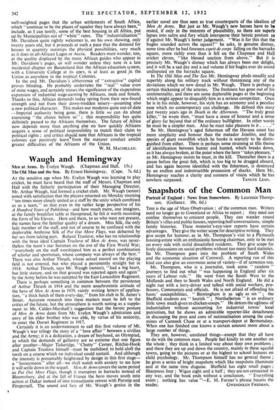Waugh and Hemingway
AT the sensitive age when Mr. Evelyn Waugh was learning to play cricket, he must have heard that the staff of Messrs. Chapman and Hall with the fatherly participation of their Managing Director, Mr. Arthur Waugh, had formed a cricket club. Mr. Waugh (senior) noted with satisfaction that the players returned =Monday morning "ten times more clOsely united as a staff by the unity which combined us as a team," so that even in the rather large perspective of his A Hundred Years of Publishing—and how much more, one imagines, at the family breakfast table at Hampstead, he felt it worth recording the form of his Eleven. Here and there, to us who were not present, the names have the familiar quality of a dream. Miss Silk, the only lady member of the staff, and not of course to be confused with the deplorable Ambrose Silk of Put Out More Flags, was debarred by her sex from taking part. Roland Truslove, who has no relationship with the beau ideal Captain Truslove of Men At Arms, was never- theless the team's star batsman on the eve of the First World War; "everybody on the staff worshipped him as a perfect combination of scholar and sportsman, whose company was always of the best." There was also Arthur Thrush, whose actual record on the playing field is not entered, but who played a persistently straight bat in 1914. Arthur Thrush, says Mr. Waugh (senior), "had a big heart, but little stature, and on that ground was rejected again and again" by the Army before he was accepted by the East Lancashire Regiment. There is perhaps something in common between the persistence of Arthur Thrush in 1914 and the more anachronistic attitude of the hero of Men At Arms in 1939, vainly writing letters of applica- tion, "a thick batch of them every-day," from his club in St. James's Street. Accurate research into these matters must be left to the critics of the future, but the atmosphere is worth noting as a supple- ment to Mr. Calder-Marshall's suggestion that the heroic posture of Men At Arms dates from Mr. Evelyn Waugh's admiration and envy of his elder brother who was able, by virtue of his seniority, to enter the Dorset Regiment in 1917.
Certainly it is an understatement to call this first volume of Mr. Waugh's war trilogy the story of a "love affair" between a civilian and the Army; it is a dedication, a dream of boyhood, an Olympiad, in which the demands of gallantry are so extreme that one figure after another—Major Tickeridge, "Chatty" Corner, Ritchie-Hook and Captain Truslove himself—must be mobilised to hold aloft the torch on a course which no individual could sustain'. And although the intensity is presumably heightened by design in this fist stage— a "honeymoon" after all—we shall watch with anxiety to see how it will settle down in the sequel. Men At Arms covers the same period as Put Out More Flags, though it transpires in barracks instead of Bloomsbury, and at the fall of France the hero moves south into action at Dakar instead of into transatlantic retreat with Parsnip and Pimpernel The sound and fury of Mr. Waugh's genius in the earlier novel are thus seen as true counterparts of the idealism of Men At Arms. But just as 'Mr. Waugh's new heroes have to be rested, if only in the interests of plausibility, so there are superb lapses into satire and fury which intersperse their heroic posture as if against Mr. Waugh's better judgemeht. "Was it for this that the bugles sounded across the square?" he asks, in genuine dismay, some time after he had foreseen esprit de corps falling on the barracks square, more richly even than it fell on the Chapman and Hall cricket eleven, "like blessed unction from above." But it is precisely Mr. Waugh's dismay which has always been our delight, and it will be a sad day and a sad volume if hie bugles ever do sound undisputed on the barracks square.
In The Old Man and, The Sea Mr. Hemingway plods steadily and superbly along his solitary track without threatening any of the deviations which we now dread in Mr. Waugh. There is perhaps a certain thickening of the arteries. The freshness has gone out of his sentimentality, and there are some deplorable pages at the beginning which might appear to disqualify him as a serious competitor. Once he is in his stride, however, his style has an economy and a peculiar ease which no contemporary can challenge. He defined this story just twenty years ago in Death in the Afternoon. "The truly great killer," he wrote then, "must have a sense of honour and a sense of glory far beyond that of the ordinary bullfighter. In other words he must be a simpler man. Also he must take pleasure in it . . . ." So Mr. Hemingway's aged fisherman off the Havana coast has more simplicity and honour than the matador Jciselito, and the species of giant swordfish which he hooks is scarcely to be clistin- &gushed- from either. There is perhaps some straining at tills theme of identification between hunter and hunted, which breaks down, as it has always broken, at the point where the hero "takes pleasure," as Mr. Hemingway insists he must, in the kill. Thereafter there is a pause before the great fish, which is too big to be dragged aboard, and has again become identified with the fisherman, is destroyed by. an endless and indestructible procession of sharks. Here Mr. Hemingway reaches a clarity and sureness of vision which he has


































 Previous page
Previous page